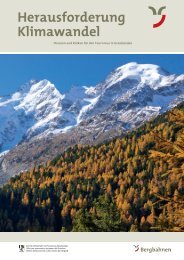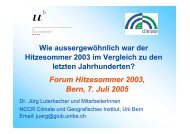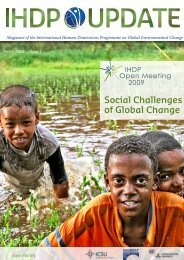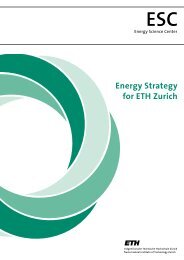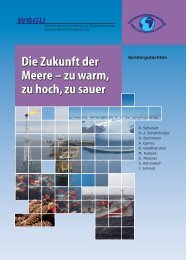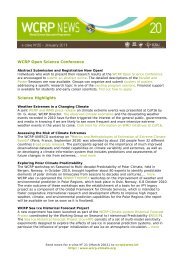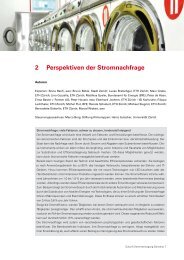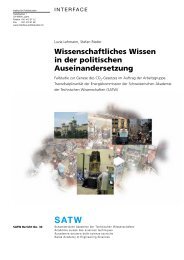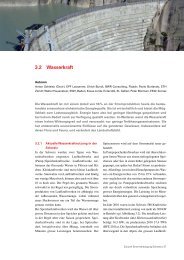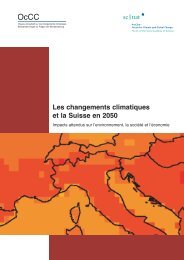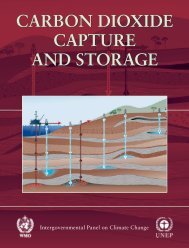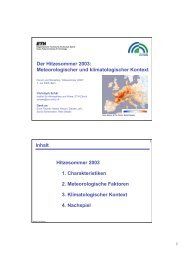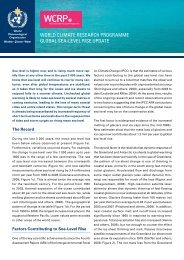Global Change Abstracts The Swiss Contribution - SCNAT
Global Change Abstracts The Swiss Contribution - SCNAT
Global Change Abstracts The Swiss Contribution - SCNAT
You also want an ePaper? Increase the reach of your titles
YUMPU automatically turns print PDFs into web optimized ePapers that Google loves.
70<br />
were counteracted by accelerated leaf senescence<br />
in the highest O-3 treatment. <strong>The</strong> results suggest<br />
that effects of elevated O-3 on the productivity<br />
and floristic composition of subalpine grassland<br />
may develop slowly, regardless of the sensitive response<br />
to increasing N.<br />
New Phytologist, 2007, V175, N3, pp 523-534.<br />
08.1-87<br />
Volcanic explosive eruptions of the Vesuvio<br />
decrease tree-ring growth but not photosynthetic<br />
rates in the surrounding forests<br />
Battipaglia G, Cherubini P, Saurer M, Siegwolf R T<br />
W, Strumia S, Cotrufo M F<br />
Switzerland, Italy<br />
Plant Sciences , Forestry , Meteorology & Atmospheric<br />
Sciences<br />
Volcanic eruptions impact the global and the<br />
hemispheric climate, but it is still unknown how<br />
and to what degree they force the climate system<br />
and in particular the global carbon cycle. In this<br />
paper, the relationships between individual eruptions<br />
(reconstructed for the past using written records),<br />
tree primary productivity (estimated using<br />
ring widths), photosynthetic rate and stomatal<br />
conductance (assessed by carbon and oxygen isotope<br />
data) are investigated, to understand the impact<br />
of volcanic eruptions on net primary production.<br />
Data from a mixed stand of Fagus sylvatica<br />
L. and Acer pseudoplatanus L. located in the area<br />
of the Vesuvio volcanic complex (Southern Italy)<br />
showed a significant decrease in ring width following<br />
each eruption. Isotope analyses indicate a<br />
change in climatic conditions after such events.<br />
Specifically, the lower oxygen isotope ratio in the<br />
tree-ring cellulose strongly suggests an increase in<br />
relative humidity and a decrease in temperature,<br />
with the latter resulting in a strong limitation<br />
to tree-ring growth. <strong>The</strong> carbon isotope ratio was<br />
only moderately but not significantly reduced in<br />
the years of volcanic eruption, suggesting no major<br />
changes in C fixation rates. This work is a case<br />
study on the effects of volcanic eruptions resulting<br />
in strong climatic changes on the local scale.<br />
This is an opportunity to explore the process and<br />
causal relationships between climatic changes<br />
and the response of the vegetation. Thus, we propose<br />
here a realistic model scenario, from which<br />
we can extrapolate to global scales and improve<br />
our interpretations of results of global studies.<br />
<strong>Global</strong> <strong>Change</strong> Biology, 2007, V13, N6, JUN, pp<br />
1122-1137.<br />
<strong>Global</strong> <strong>Change</strong> <strong>Abstracts</strong> – <strong>The</strong> <strong>Swiss</strong> <strong>Contribution</strong> | Terrestrial Ecosystems<br />
08.1-88<br />
Intensified grazing affects endemic plant and<br />
gastropod diversity in alpine grasslands of the<br />
Southern Carpathian mountains (Romania)<br />
Baur B, Cremene C, Groza C, Schileyko A A, Baur<br />
A, Erhardt A<br />
Switzerland, Romania, Russia<br />
Plant Sciences , Biodiversity , Ecology , Zoology<br />
Alpine grasslands in the Southern Carpathian<br />
Mts, Romania, harbour an extraordinarily high<br />
diversity of plants and invertebrates, including<br />
Carpathic endemics. In the past decades, intensive<br />
sheep grazing has caused a dramatic decrease<br />
in biodiversity and even led to eroded soils at<br />
many places in the Carpathians. Because of limited<br />
food resources, sheep are increasingly forced<br />
to graze on steep slopes, which were formerly not<br />
grazed by livestock and are considered as local<br />
biodiversity hotspots. We examined species richness,<br />
abundance and number of endemic vascular<br />
plants and terrestrial gastropods on steep slopes<br />
that were either grazed by sheep or ungrazed by<br />
livestock in two areas of the Southern Carpathians.<br />
On calcareous soils in the Bucegi Mts, a total<br />
of 177 vascular plant and 19 gastropod species<br />
were recorded. Twelve plant species (6.8%) and<br />
three gastropod species (15.8%) were endemic to<br />
the Carpathians. Grazed sites had lower plant and<br />
gastropod species richness than ungrazed sites.<br />
Furthermore, grazed sites harboured fewer gastropod<br />
species endemic to the Carpathians than<br />
ungrazed sites. On acid soils in the Fagaras Mts, a<br />
total of 96 vascular plant and nine gastropod species<br />
were found. In this mountain area, however,<br />
grazed and ungrazed sites did not differ in species<br />
richness, abundance and number of endemic<br />
plant and gastropod species. Our findings confirm<br />
the high biodiversity of grasslands on steep slopes<br />
in the Southern Carpathian Mts and caution<br />
against increasing grazing pressure in these refuges<br />
for relic plants and gastropods as well as for<br />
other invertebrates.<br />
Biologia, 2007, V62, N4, AUG, pp 438-445.<br />
08.1-89<br />
Effect of rock climbing on the calcicolous<br />
lichen community of limestone cliffs in the<br />
northern <strong>Swiss</strong> Jura Mountains<br />
Baur B, Froeberg L, Müller S W<br />
Switzerland, Sweden<br />
Plant Sciences , Ecology<br />
Exposed limestone cliffs in the <strong>Swiss</strong> Jura Mountains<br />
harbour a diverse lichen community with<br />
some rare species. Sport climbing has recently<br />
increased in popularity on these cliffs. We examined<br />
the effect of sport climbing on calcicolous



